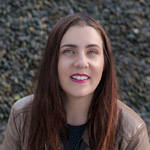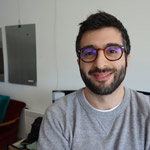Meet Four of Our TV Writer-Alumni: Marsha Greene, Julia Holdway, Jordi Mand, Shebli Zarghami
Posted: Apr 18, 2019
Posted: Apr 18, 2019
Applications are open for our
Bell Media Prime Time TV Program until May 3, 2019. The program, which has been running 19 years strong at the CFC, delivers a real-world story room experience, develops strong series writers, and creates original series content for the marketplace.
Below, four alumni of the Bell Media Prime Time TV Program reflect on their time at the CFC, share some of the insights they gained, and explore how their time in the program has contributed to their more recent successes, which span various genres, tones and platforms. As a cross-section of writers, they also reveal the rich breadth and depth of writers the TV program attracts.

Writer-producer
Marsha Greene has written for the series Private Eyes (Global), Ten Days in the Valley (ABC), and the critically acclaimed Mary Kills People (Global and Lifetime). On Mary’s third season, she served as executive producer and co-showrunner, and has earned two Canadian Screen Award nominations for writing on the series.

Vancouver-based screenwriter
Julia Holdway was in the writers’ room for the final season of Bates Motel (NBCUniversal & A&E), CBC’s Burden of Truth, and her pilot, Infamous, was a finalist for the Sundance Episodic Lab. Holdway is the 2018 winner of Netflix’s Diversity of Voices award.

Award-winning Toronto-based playwright
Jordi Mand has worked with some of Canada’s most prominent theatre companies. Mand is a writer on the fourth season of CTV’s drama Cardinal, and the upcoming film adaptation of Harriet Alida Lye’s thriller, The Honey Farm.
 Comedy writer Shebli Zarghami started out as a freelance journalist before becoming head writer and producer for the hit CBC series, Mr. D. Zarghami also co-created Agnes and Harold, an official selection of the LA Comedy Festival.
Comedy writer Shebli Zarghami started out as a freelance journalist before becoming head writer and producer for the hit CBC series, Mr. D. Zarghami also co-created Agnes and Harold, an official selection of the LA Comedy Festival.
Marsha Greene: There is a special place in my heart for the writers from my year. We were in this little bubble together, a particular experience that only the eight of us have. We saw each other through horrible notes sessions, endless drafts and awkward pitches, and we had each other’s backs. I learned that’s how a writers room should be – a safe space for people to be vulnerable and terrible alongside being smart and insightful. Michael MacLennan, our showrunner, taught us so much about writing, things I didn’t even realize I didn’t know – not only about writing, but also about the business – and after the program was over, he championed us out in the world.
Jordi Mand: At the CFC, I worked with some truly incredible people: Dennis Heaton (our executive producer in residence), Lesley Grant (our original series mentor), Patrick Tarr (my personal original series mentor), Stephanie Morgenstern (my director for my original series teaser) and Kathryn Emslie (Chief Programs Officer, CFC). I came to the CFC with minimal experience in TV, my background was in theatre so while I had a strong grasp of character, dialogue and stakes, there were huge technical gaps in my understanding of how TV worked. This group of amazing mentors helped me bridge those gaps and showed me how to strengthen the storytelling skills I already had.
Shebli Zarghami: The duration of the program is essentially this intensive rollercoaster of relationship-building. You can’t really overstate the importance of that. It’s been years since I was at the CFC, but most meetings I go into are still with people I first met through the program. At first, my association with the CFC was one of the main reasons I got into those meetings, whether because of the contacts I made there or the legitimacy it gave me as a TV writer. I’m also still close friends with my co-writer from my time there, and it’s really helpful to have that shared experience with someone you trust and compare notes as you move through your career and learn more about the industry.
Julia Holdway: As a proud introvert, I think building relationships is an exciting yet terrifying experience! The magic of this program was the six of us working together to formulate mind blowing, innovative characters and storylines. Everyone came from such different backgrounds, which allowed us to see the writer’s opinions from different points of view. It’s great when you pitch something in a room and one of your colleagues says “Whoa that’s really fucked up.” That’s when you know you’re really onto something. You have to dig deep and trust the people in the room. It’s those moments that have encouraged me to lean into those messed up ideas – avoid the stereotypes.
Mand: There are so many, but the one I come back most is embracing notes. Writers can have adverse reactions to getting notes, but when you write, you’re never writing in isolation. Other people are always involved in the process. You’re going to get notes. Lots of them. It’s important to embrace and understand that – and be comfortable with that. It can be really hard but it’s important to find a way to make the notes process yours, and take the notes you’re given to make the script you’re working on even better.
Greene: The most valuable thing I learned in Michael’s story room was to go beyond what we did in the room. When you go home to write, you don’t simply regurgitate what we did in the room. It’s your job, as a writer, to find something new and surprising, to get inside of it and find the magic. You need to stick to the blueprint, of course, but the challenge and the joy of writing television is to both write to the series and make it your own.
Holdway: There’s so many different rules you hear from senior writers, but I think the most important one is to be yourself (saying that, it’s also probably the most difficult to abide by). Know that there’s a reason you were put in that room. It’s your talent and point of view that got you there. To excel, you can’t be afraid to speak up, and if the showrunner doesn’t like it, (oh, well) roll onto the next idea.
Zarghami: Going into the TV program, I’d only worked alone or with a close and supportive friend whom I felt comfortable pitching. I had a bit of a hang-up in the CFC story room early on because I needed to perfect my ideas in my head before pitching them. Except then you just become the quiet person. Over time I realized it’s more important to be part of the conversation. The room can take a small idea you weren’t sure about and turn it into something great.
Holdway: I was incredibly lucky to have tremendous support from Dennis Heaton, Lesley Grant and Graeme Manson. One of the most wonderful things about the CFC is how they encourage you to explore your voice – and refine it. Looking back, I love how Kathryn Emslie really encouraged me to explore the near-death experience I had as a child and understand how that made me see the world differently.
Zarghami: I submitted a pilot as part of my application, one that was an outright comedy, but the CFC cut through to how personal the story was for me. Their support and encouragement for what I’d written was one of the most validating experiences of my life. Throughout my time at the CFC, they emphasized continuing to make the work personal, because it’s the best way to avoid writing something sort of generic.
Greene: The CFC is all about finding your original voice. We were encouraged to come up with several ideas for series, develop them over weeks, and then chose one to take to pilot. The more we generated ideas, the more we discovered what themes interested us, what topics or characters or feelings we were always trying to explore with our writing. Once we chose an idea to pursue, we had the opportunity to explore and explain why we were passionate about it. I truly believe I discovered my voice as a writer by going through the CFC program.
Mandi: Of the six original series that were created during my time at in the program, mine was the darkest – by far. It was about a child pornography ring that was exposed in a suburban neighbourhood in the late ‘90s. I knew while I was developing the idea that it wasn’t necessarily sellable, but this was the story I was drawn to and wanted to write. I never once got an ounce of pushback. In fact, I was only encouraged to go deeper with the idea – because it was important to me and it was an important story to tell.
Zarghami: The final season of Mr. D just ended and I was head writer on that. Now I’m working on a few projects that are at different stages. Jessie Gabe and I collaborate a lot, so we’re developing something right now. I’m also working with Dave Merheje and Ali Hassan on a project that’s been a lot of fun.
Mand: I was hired by my mentor Patrick Tarr as a writer for Cardinal season four, and I can’t wait for audiences to see it. Currently, I am working on a few new plays in development, writing the film adaptation of Harriet Alida Lye’s thriller novel, The Honey Farm, and co-writing a pilot for an original TV series. It’s too early to talk about that last project here (I’m incredibly superstitious), but I will say that the concept for the show has us feeling really excited.
Holdway: There is a deal currently in negotiation with my pilot, Vital Signs, but I can’t give any further details at this point. I also just finished the first draft of a police procedural that I had been mulling over for a long time. I’ll do another handful of drafts and then finally send to my agency to get their notes, and then I’ll probably do another draft, and then I’ll send it out into the world, and then I’ll probably do another draft. You see the pattern here? I’m usually not happy with a script until I’ve done at least 40 drafts!
Greene: I’m about a month away from finishing the third and final season of Mary Kills People, which I’ve been working since season one. I’ve gone from story editor to showrunner, and worked with some of the finest writers in the country. It’s been a pleasure and a privilege, so the end is bittersweet. I also have a show in development with CBC (created by another writer, and I was brought on as the showrunner). It’s a one-hour drama about a family of con artists that is funny, messy family drama and super fun to write. I would be absolutely thrilled if we got to make it!
Greene: I was absolutely floored at the season four finale of Jane the Virgin. The series somehow manages to be both a crazy telenovela and also a grounded family show. It’s funny, it’s surprising, it’s got heart, and there’s nothing else like it.
Zarghami: I really liked PEN15. It’s basically a love story about this beautiful high school friendship that seamlessly runs between being really funny and emotionally affecting.
Holdway: The current season of The Good Fight is brilliant. The writing is sharp and the performances shockingly good. It feels incredibly brave and vital, especially in today’s political arena. I’m also really excited for Kerry Ehrin’s new show The Morning Show, which will debut on Apple this fall, staring Reese Witherspoon and Jennifer Aniston. Ehrin is one of the most superbly talented writers/showrunners I’ve ever met, so if she is behind this show, it means people should definitely tune in!
Mand: One series that has recently really blown me away is Please Like Me, created by Josh Thomas, an Australian television comedy/drama series on Netflix. The show ran for four seasons from 2013-2016, but I only discovered it this year. It’s really special and looks at the impacts of mental illness, love and loss. It strikes a beautiful balance between heart-full and heartbreak.
Responses have been edited and condensed for publication.
Share this post: